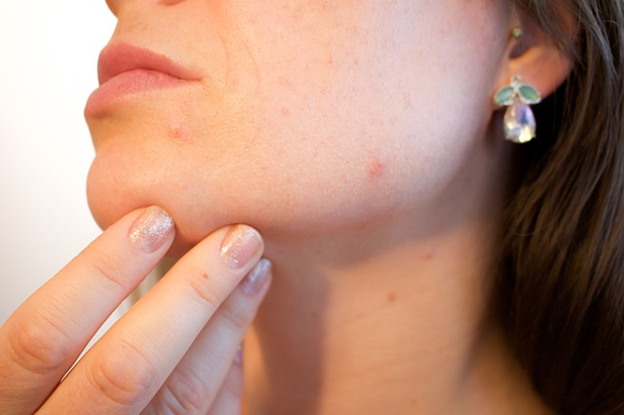Essential Steps You Need to Take To Prevent Acne Scars

Did you know that acne affects approximately 40 million to 50 million individuals in the United States?
Acne can cause physical and emotional scars that last long after the blemishes have faded.
But don’t worry. Keep reading because this guide provides clear, step-by-step instructions on how to prevent acne scars from forming in the first place.
What Is Acne?
Acne is a common skin condition that occurs when your hair follicles become plugged with oil and dead skin cells. This can cause blackheads, whiteheads, or pimples. Acne is most commonly seen on the face, chest, and back.
While acne is usually not a serious health concern, it can be bothersome and cause emotional distress. Severe acne can lead to permanent scarring.
There are many myths about what causes acne. Chocolate and greasy foods are often blamed, but there is no evidence that they play a role in acne. Instead, genes, hormones, and the environment are thought to be the main factors involved.
Acne is a condition of the skin that shows up as different types of bumps. They can be blackheads, whiteheads, pimples, or cysts. Teens get acne because of the hormonal changes that come with puberty. If your parents had acne as teens, it’s more likely that you will, too.
The good news is that, for most people, acne goes away almost completely by the time they are out of their teens. But here are some essential steps you need to take to prevent acne scars:
Clean Your Skin
First, it’s important to clean your skin properly. This means using a gentle cleanser that won’t strip your skin of its natural oils. You should also exfoliate regularly to remove dead skin cells that can clog pores and lead to breakouts.
Finally, be sure to moisturize both in the morning and at night to keep your skin hydrated and prevent dryness, which can also lead to breakouts.
Don’t Pick Your Pimples
Second, be careful not to pick at your pimples. It may be tempting, but popping pimples can actually cause more damage and lead to scarring. If you do need to pop a pimple, make sure to do it the right way.
Gently wash your face with a mild cleanser and warm water. Then, using clean hands and a cotton swab, apply pressure to the sides of the pimple until it pops. Finally, rinse your face with cool water and apply a soothing moisturizer.
Use Sunscreen
Most people are aware of the dangers of spending too much time in the sun without protection. UV rays can cause sunburn, skin damage, and even skin cancer.
However, many people fail to realize that these same ultraviolet rays can also aggravate acne breakouts and cause scars. For those who suffer from acne, it is essential to use a sunscreen with a high SPF rating when spending time outdoors.
In addition, it is important to choose a sunscreen that is non-comedogenic, meaning it won’t clog pores and contribute to breakouts.
See a Dermatologist
Anyone who has ever struggled with acne knows that it can be more than just a cosmetic issue. Severe acne can lead to feelings of low self-esteem, depression, and anxiety. In extreme cases, it can even lead to suicidal thoughts.
If you are struggling with severe acne, it is important to seek professional help. A dermatologist can prescribe medication that can help to clear up your skin and prevent scarring.
In addition, a dermatologist can provide you with advice and support on how to deal with the emotional impact of acne.
Be Patient
Developing a skincare routine can be an immensely satisfying process. After all, who doesn’t enjoy taking care of their appearance and pampering themselves with luxurious products? However, it’s important to remember that change doesn’t happen overnight.
Just as it took time for your skin to become unbalanced, it will also take time—and patience—to see results from any treatment regimen.
So don’t despair if you don’t see an immediate improvement; with consistency and care, you will achieve the clear, smooth skin you’ve been dreaming of. Trust us, it’ll be worth the wait.
Moisturize
As we mentioned earlier, moisturizing is key to preventing acne scars. Moisturizers help to keep your skin hydrated, which in turn helps to reduce inflammation and speed up the healing process.
There are a variety of different moisturizers on the market, so it’s important to find one that suits your skin type. If you’re not sure what type of moisturizer to use, consult a skin care specialist or dermatologist.
Eat a Healthy Diet
Last but not least, one of the best things you can do for your skin is to eat a healthy diet. A diet that is high in processed foods, sugar, and unhealthy fats can contribute to breakouts and make acne scars more pronounced.
On the other hand, a diet that is rich in fresh fruits, vegetables, and healthy fats can help to improve your skin health. So, if you’re serious about preventing acne scars, make sure to eat plenty of nutrient-rich foods.
Cryotherapy
Cryotherapy is a process where the skin is exposed to sub-zero temperatures in order to promote healing. Common areas that are treated with cryotherapy include:
- Elbow
- Knee
- Shoulder
- Ankle
The skin reacts to cold temperatures by constricting blood vessels and reducing inflammation. This can help to reduce the appearance of scars and speed up the healing process.
If you are interested in trying cryotherapy, make an appointment with a dermatologist or skin care specialist to prevent acne scarring.
Learn How to Prevent Acne Scars
Acne scars can be a real confidence killer, but they don’t have to be. By following the essential steps we outlined in this article, you can prevent acne scars.
And if you already have some scars, don’t worry – there are treatments available that can help lessen their appearance.
Be sure to check out our blog for more helpful articles like this one.






